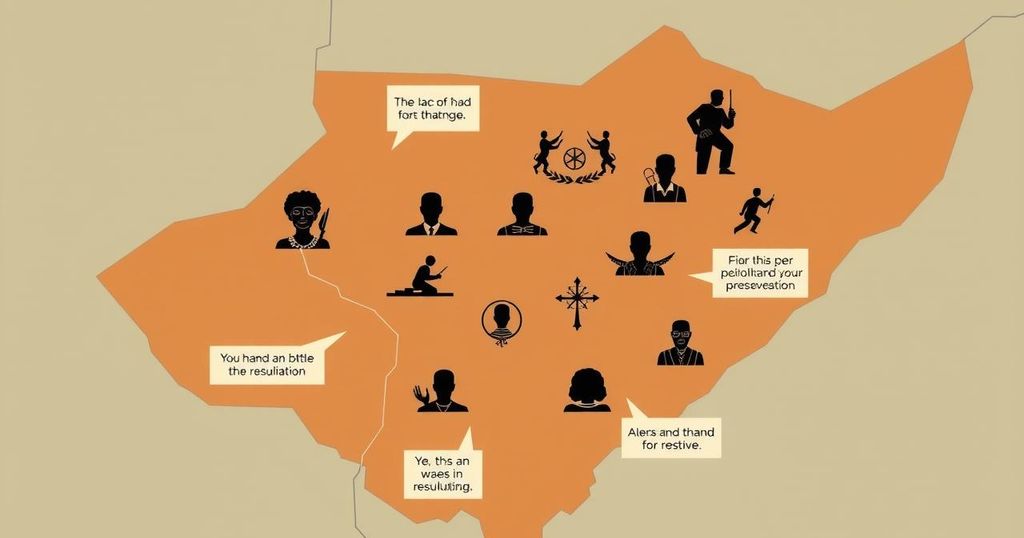In South Sudan, internal rebellion is unlikely due to familial ties among leadership. Opposition groups have faltered in uniting due to personal ambitions, lacking a coherent national vision. Without effective political alternatives and international support for political party development, the regime’s grip on power remains strong. The transformation of opposition into credible political movements, akin to successes seen in other countries, is imperative for facilitating a democratic transition.
Autocratic governments often face internal collapse due to revolts or unite against a common enemy. However, in South Sudan, internal rebellion is unlikely due to familial ties and an enclosed leadership structure. Despite some internal disputes, these are driven more by personal gain than by a political vision. As political literacy is limited and strong institutions like the military are lacking, the current regime maintains its power. While a popular uprising remains a possibility, it requires conditions beyond state failure and sporadic violence, which have not prompted mass protests due to South Sudan’s history of dysfunction.
For political change to occur in autocratic regimes, a credible and unified opposition is essential, especially when internal revolts seem unlikely. South Sudan’s opposition groups, unfortunately, have failed to provide a clear national vision or mobilize citizens effectively. Fragmentation and personal ambitions within these groups have rendered them susceptible to co-optation by the ruling elite, significantly weakening their role in challenging the regime.
President Salva Kiir and his close associates utilize tactics involving coercion and bribery to suppress rivals and maintain power. Many opposition parties have emerged as entities that benefit from the regime’s tactics rather than construct resilience against them. Consequently, these groups often splinter due to personal ambition, struggle to unify, and lack a comprehensive plan to address the core conflict issues.
The opposition groups mostly emerge during peace negotiations but fail to sustain themselves under pressure. Their existence primarily serves political bargaining rather than long-term nation-building. Instead of offering strategic alternatives, they focus on personal rivalries, echoing the flaws of the government they oppose. Their internal dynamics remain influenced by historical rivalries, prioritizing personal gain over national interests and further eroding public trust.
The pattern of unsuccessful deals and quick fragmentation has overshadowed these groups’ credibility. They mirror many of the ruling government’s worst habits, favoring patronage and opportunism instead of exhibiting principled leadership. Their failure to establish institutions that facilitate peaceful governance and a sustainable national vision poses significant challenges for South Sudan’s future.
Despite the challenges, South Sudan’s opposition has the potential to unite under a singular, purposeful front. By prioritizing a visionary future for their country over past grievances, they can motivate a diverse populace and foster a sense of national unity. Constructing a unifying vision requires nationalistic and visionary leadership that transcends ethnic divisions and offers hope for shared prosperity.
To effectively disrupt the authoritarian regime in Juba, opposition leaders must connect with grassroots communities and avoid succumbing to external pressures. Should they successfully present a united front and shift their focus towards national integrity, South Sudan could have a realistic pathway to stability and hope. The opportunity to unite and push for change remains critical as ongoing divisions hinder progress.
Historical evidence suggests that effective changes occur when opposition groups consolidate and evolve into credible political movements. Various countries have demonstrated that armed factions can transform into political parties, facilitating peaceful political engagement and healing post-conflict divisions. However, this transformation necessitates substantial international investment in political party development and democratic institutions.
The success of political parties in transitional environments has been exemplified by movements like RENAMO in Mozambique and FMLN in El Salvador, successfully transitioning from conflict to political engagement. In numerous cases, international support has been instrumental in aiding factional transitions and fostering peaceful political competition in post-conflict nations.
South Sudan’s history is marked by a lack of robust political parties due to systematic suppression under Sudanese rule. While other African liberation movements benefited from international support in developing their political wings, South Sudan’s movements, such as the SPLM, have lacked consistent backing. This deficiency has resulted in a turbulent political landscape marked by weak institutions and factionalism, impeding the establishment of legitimate political competition.
To foster a transitional democracy in South Sudan, supporting political parties and civic movements, such as the People’s Coalition for Civil Action (PCCA), is imperative. While nurturing the political aspects of former armed resistance groups poses challenges, civic movements provide crucial avenues for democratic competition. Most international support directed towards South Sudan has been limited to service delivery and advocacy, leaving a significant gap in political development. A strategic investment in political party evolution and civic initiatives could be pivotal in enabling a stable democratic transition.
In summary, the opposition groups in South Sudan face significant challenges rooted in fragmentation and personal ambition, preventing them from effectively challenging the regime. Historical lessons emphasize the necessity of unity among opposition factions to foster credible movements for change. Moreover, substantial international support for political party development and civic movements is crucial in facilitating a shift towards democratic governance in South Sudan. The future stability and prosperity of the nation will depend on the ability of its opposition leaders to transcend divisions and articulate a cohesive vision for a better tomorrow.
Original Source: www.radiotamazuj.org






